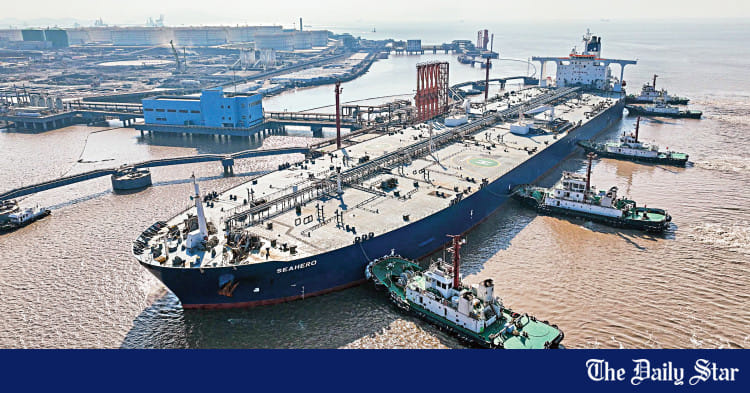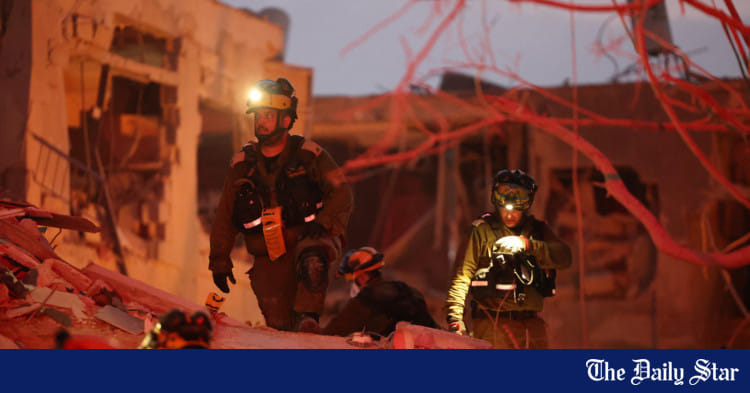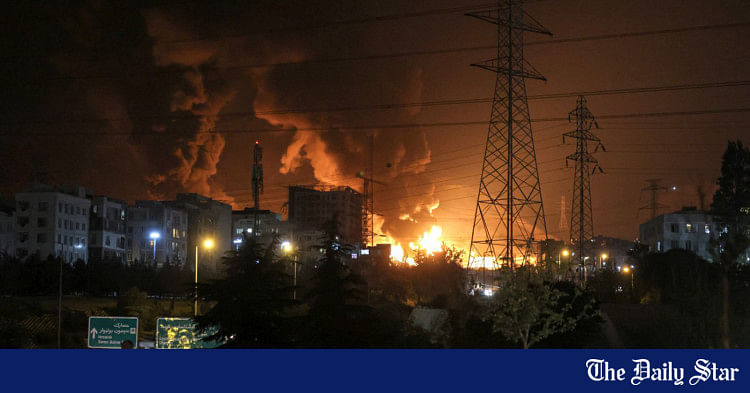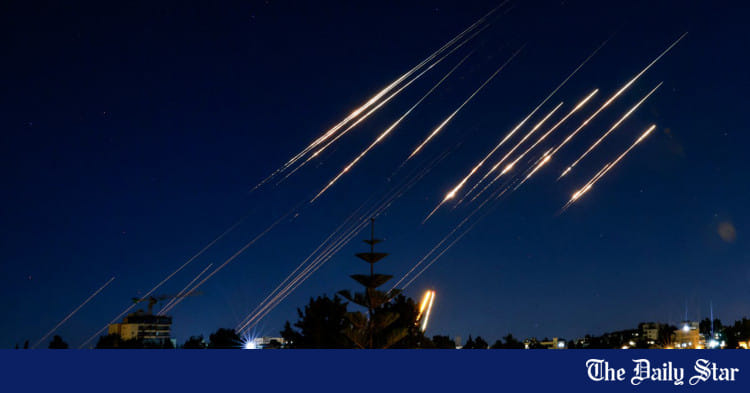Saif
Senior Operative
- 13,241
- 7,264
- Origin

- Axis Group

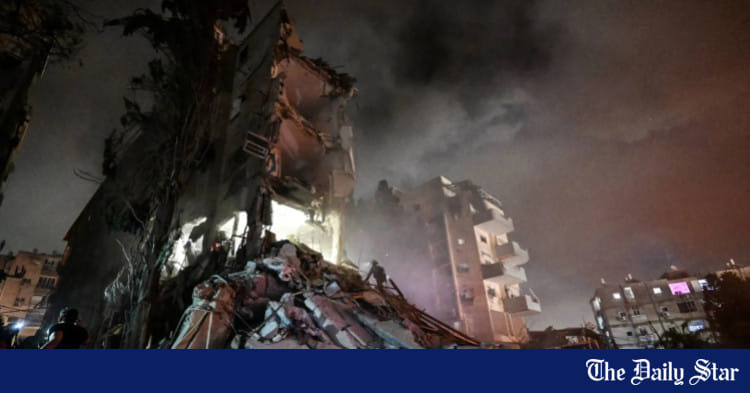
A catastrophe called Israel
How long can Iran's arsenal of reportedly 2,000 ballistic missiles last?
A catastrophe called Israel

Rescue personnel work at a residential building following missile attack from Iran on Israel, at central Israel on June 15, 2025. PHOTO: REUTERS
Any military campaign must have clearly defined objectives, and Israel said its main aim of starting a war with Iran, through its ongoing massive air attacks with tacit backing from US and Western governments, was to stop Tehran's march towards the acquisition of nuclear weapons.
It may not have been so openly stated, but one important objective is regime change in Iran in order to try and usher in a regime more like Israel's other Middle Eastern/regional neighbours, who are happy to be friends with Tel Aviv. That is why they offer only perfunctory condemnation of Israel's ethnic-cleansing of Palestinians not just in Gaza, but also the West Bank.
A wider war also helps shift the focus from the worst ethnic cleansing of this century in Gaza by relentless bombing, other military means, and mass starvation. It is the food blockade which was beginning to create a little unease among at least Israel's European allies, who have so far offered unconditional material and diplomatic support to it on Gaza.
At least the European allies, I say, because the US administration solidly supports the apartheid state, which is executing the American president's Gaza Riviera Plan. It visualises beachside resorts after the forceful displacement of two million Palestinians to unspecified countries, presumably Muslim.
The Gaza genocide has really not been about Israeli hostages taken during the October 2023 atrocity. Ample evidence of this can be found in the conduct of presidential envoy Steve Witkoff, whose family members are crypto business partners with the Trump family. He has walked away twice, if not more times, from deals that could have secured the release or exchange of the remaining hostages in Hamas captivity. Meanwhile, hundreds of Palestinians remain in Israeli captivity who are no more than hostages.
Despite this unconditional support to Israel, President Donald Trump so far seems unprepared to commit US forces in any open confrontation. Over the coming days, Israeli Prime Minister Benjamin Netanyahu's efforts will be directed towards somehow sucking in the US to commit forces into the war with Iran.
After the Iranian missile retaliation against the Israeli air campaign, which killed several senior Iranian military commanders, leaders of the Islamic Revolutionary Guard Corps, and targeted nuclear sites, former Israeli Prime Minister and Military Chief Ehud Barak picked off some of these objectives one by one in an interview with CNN's Christiane Amanpour.
Ehud Barak was categorical in saying that Israel's air campaign may have "delayed" by a few weeks Iran's acquisition of a nuclear weapon but, he said, even if the US joined the air campaign, it would delay it by no more than a few months at best. "They have 400 kilogrammes of 60 percent enriched uranium and it can be enriched to 90 percent in a garage with the right equipment and they will have a crude bomb," he said.
Quoting the chief of the IAEA (the international nuclear watchdog), who said that many of Iran's key facilities are "hundreds of yards" underground in old mines, etc, Mr Barak maintained these were "out of our reach". "I have no illusions we'll do anything more than damage or hurt them."
The former IDF chief said the initial successes of the air campaign, which exceeded expectations, should be used to push through a nuclear deal with Iran, stop the war in Gaza, and go for peace in the wider region, including Saudi Arabia, which would take time and won't be easy but still needs to be done.
He said going further for Israel without US logistics support will be difficult, so it should say "we have done all we could do, now it is up to you." At a time when Israeli intelligence's targeting of the Iranian military's key leaders is being seen as a manifestation of internal divisions, Ehud Barak also addressed the issue of regime change.
Saying it did not appear possible without US ground troops on Iranian soil, he listed wars from Korea to Vietnam to Afghanistan that the US entered but was unable to win: "How did those wars go?" he asked, while doubting that President Trump, or any other US leader or the American public for that matter, would have the appetite to commit US boots to the ground.
It is true that in 2018, Trump unilaterally scuppered an Obama-led deal that stopped Iran's nuclear weapons march in exchange for sanctions relief. But the scrapping pushed Tehran back to restarting its enrichment levels closer to weapons grade. So, in a sense, this war hasn't been about Iran's nuclear arms quest but more about getting it to bow to Israeli-US will.
Therefore, it is important to see who is eventually likely to get the upper hand in this conflict. With the US and entire Western production, stores and supplies of modern weaponry at its disposal, it would be safe to assume Israel can outlast Iran in a war of attrition. For all practical purposes, Iran has no air force, and its air defence system appears inadequate.
How long can its arsenal of reportedly 2,000 ballistic missiles last? What happens beyond that? These are some of the questions that need to be answered. So far, Iran has taken massive hits and yet has been able to remain defiant and retaliate. Can it sustain this in the medium to long term, and will there be any third-party mediation to stop the war?
Or, if cornered further, will Iran lash out directly at US bases and assets in the region and even nations hosting them in order to expand the conflict as a means of stopping it? The impact of any such eventuality will not only be on millions of lives in the region but also on the global economy.
Abbas Nasir is a former editor of Dawn.
This article was originally published in the Dawn on June 15, 2025.
Rescue personnel work at a residential building following missile attack from Iran on Israel, at central Israel on June 15, 2025. PHOTO: REUTERS
Any military campaign must have clearly defined objectives, and Israel said its main aim of starting a war with Iran, through its ongoing massive air attacks with tacit backing from US and Western governments, was to stop Tehran's march towards the acquisition of nuclear weapons.
It may not have been so openly stated, but one important objective is regime change in Iran in order to try and usher in a regime more like Israel's other Middle Eastern/regional neighbours, who are happy to be friends with Tel Aviv. That is why they offer only perfunctory condemnation of Israel's ethnic-cleansing of Palestinians not just in Gaza, but also the West Bank.
A wider war also helps shift the focus from the worst ethnic cleansing of this century in Gaza by relentless bombing, other military means, and mass starvation. It is the food blockade which was beginning to create a little unease among at least Israel's European allies, who have so far offered unconditional material and diplomatic support to it on Gaza.
At least the European allies, I say, because the US administration solidly supports the apartheid state, which is executing the American president's Gaza Riviera Plan. It visualises beachside resorts after the forceful displacement of two million Palestinians to unspecified countries, presumably Muslim.
The Gaza genocide has really not been about Israeli hostages taken during the October 2023 atrocity. Ample evidence of this can be found in the conduct of presidential envoy Steve Witkoff, whose family members are crypto business partners with the Trump family. He has walked away twice, if not more times, from deals that could have secured the release or exchange of the remaining hostages in Hamas captivity. Meanwhile, hundreds of Palestinians remain in Israeli captivity who are no more than hostages.
Despite this unconditional support to Israel, President Donald Trump so far seems unprepared to commit US forces in any open confrontation. Over the coming days, Israeli Prime Minister Benjamin Netanyahu's efforts will be directed towards somehow sucking in the US to commit forces into the war with Iran.
After the Iranian missile retaliation against the Israeli air campaign, which killed several senior Iranian military commanders, leaders of the Islamic Revolutionary Guard Corps, and targeted nuclear sites, former Israeli Prime Minister and Military Chief Ehud Barak picked off some of these objectives one by one in an interview with CNN's Christiane Amanpour.
Ehud Barak was categorical in saying that Israel's air campaign may have "delayed" by a few weeks Iran's acquisition of a nuclear weapon but, he said, even if the US joined the air campaign, it would delay it by no more than a few months at best. "They have 400 kilogrammes of 60 percent enriched uranium and it can be enriched to 90 percent in a garage with the right equipment and they will have a crude bomb," he said.
Quoting the chief of the IAEA (the international nuclear watchdog), who said that many of Iran's key facilities are "hundreds of yards" underground in old mines, etc, Mr Barak maintained these were "out of our reach". "I have no illusions we'll do anything more than damage or hurt them."
The former IDF chief said the initial successes of the air campaign, which exceeded expectations, should be used to push through a nuclear deal with Iran, stop the war in Gaza, and go for peace in the wider region, including Saudi Arabia, which would take time and won't be easy but still needs to be done.
He said going further for Israel without US logistics support will be difficult, so it should say "we have done all we could do, now it is up to you." At a time when Israeli intelligence's targeting of the Iranian military's key leaders is being seen as a manifestation of internal divisions, Ehud Barak also addressed the issue of regime change.
Saying it did not appear possible without US ground troops on Iranian soil, he listed wars from Korea to Vietnam to Afghanistan that the US entered but was unable to win: "How did those wars go?" he asked, while doubting that President Trump, or any other US leader or the American public for that matter, would have the appetite to commit US boots to the ground.
It is true that in 2018, Trump unilaterally scuppered an Obama-led deal that stopped Iran's nuclear weapons march in exchange for sanctions relief. But the scrapping pushed Tehran back to restarting its enrichment levels closer to weapons grade. So, in a sense, this war hasn't been about Iran's nuclear arms quest but more about getting it to bow to Israeli-US will.
Therefore, it is important to see who is eventually likely to get the upper hand in this conflict. With the US and entire Western production, stores and supplies of modern weaponry at its disposal, it would be safe to assume Israel can outlast Iran in a war of attrition. For all practical purposes, Iran has no air force, and its air defence system appears inadequate.
How long can its arsenal of reportedly 2,000 ballistic missiles last? What happens beyond that? These are some of the questions that need to be answered. So far, Iran has taken massive hits and yet has been able to remain defiant and retaliate. Can it sustain this in the medium to long term, and will there be any third-party mediation to stop the war?
Or, if cornered further, will Iran lash out directly at US bases and assets in the region and even nations hosting them in order to expand the conflict as a means of stopping it? The impact of any such eventuality will not only be on millions of lives in the region but also on the global economy.
Abbas Nasir is a former editor of Dawn.
This article was originally published in the Dawn on June 15, 2025.

 World Affairs
World Affairs